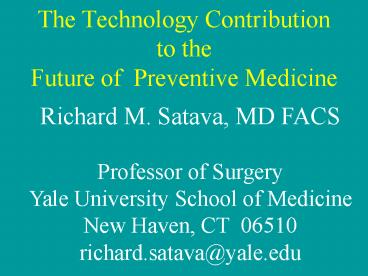The Technology Contribution to the Future of Preventive Medicine - PowerPoint PPT Presentation
Title:
The Technology Contribution to the Future of Preventive Medicine
Description:
With genetic screening, epidemiology and population analysis it will be possible ... Direct the cells to fight disease rather than proscribe drugs ... – PowerPoint PPT presentation
Number of Views:40
Avg rating:3.0/5.0
Title: The Technology Contribution to the Future of Preventive Medicine
1
The Technology Contribution to the Future of
Preventive Medicine
Richard M. Satava, MD FACS Professor of
Surgery Yale University School of Medicine New
Haven, CT 06510 richard.satava_at_yale.edu
2
Technologies that Change Healthcare
Devices for diagnosis and
treatment Pharmacological for prevention and
treatment agents
Information tools for coordination, analysis
and
dissemination of
preventive health information
3
The 5 Ps of the Future of Medicine
Predictive - Genetics, allergies, specific
medications Preventive - Acting proactively
with preventive
medicine Point of care - Mobile communications
ubiquitous
computing Parametric - Multiple parameters,
over time,
referenced to patients own
baseline, compared to standard
model Personalized -Individual treatment for each
patient
SATAVA 7 July, 1999 DARPA
4
The 5 Ps of the Future of MedicinePredictive
With genetic screening, epidemiology and
population analysis it will be possible to focus
preventive health efforts on those most highly at
risk
5
The 5 Ps of the Future of MedicinePreventive
By identifying those populations and individuals
who are at risk, medical education, screening and
treatments can become more proactive.
6
The 5 Ps of the Future of MedicineParametric
Collecting multiple parameters over
time determining the change over time
(which is more critical than isolated
measurements) Comparing that change to the
persons own baseline in the past Final
interpretation of these changes relative to a
population standard for age, sex, race, etc.
7
The 5 Ps of the Future of MedicinePoint-of-care
Continually monitoring all relevant parameters in
an unobtrusive manner wherever it is most
convenient, including the home and work place
8
The 5 Ps of the Future of MedicinePersonalized
Customizing healthcare by time, dose and method
of application so that each individual has the
SPECIFIC treatment for their needs
9
Genetic Chips
DNA based genetic screening devices will permit
the accurate genetic profiling of
susceptibilities
10
Figure 1 - Gene Chip (Affymetrix, Inc, Santa
Clara, CA)
11
Genetic Engineering
Direct the cells to fight disease rather than
proscribe drugs Extend potential life span
beyond 120 - 130 years
12
Micro-sensors and nanotechnology
Brings the ability to detect and monitor
disease down to the practical and point-of-care
level
13
Figure 2. Micro-chip embedded into watches
(Polar, Inc. Australia)
14
Figure 3 Non-invasive blood glucose sensor
(MiniMed, Inc, Northridge, CA)
15
Hand-held imaging
Provides point-of-care diagnosis of anatomic and
structural abnormalities with the capability of
remote transmission of images
16
Figure 4 Hand-held ultrasound (SonoSite, Inc,
Bothwell, WA)
17
Medical Informatics
Powerful information tools will permit
data acquisition decision support
information distribution/storage ubiquitous
access distant education
18
CONCLUSION
Technology will shift healthcare from acute,
emergent care to proactive preventive health































